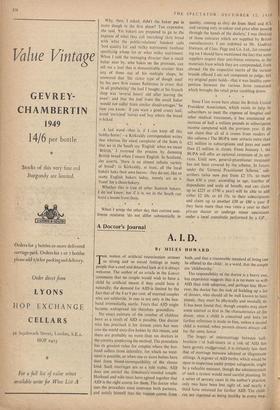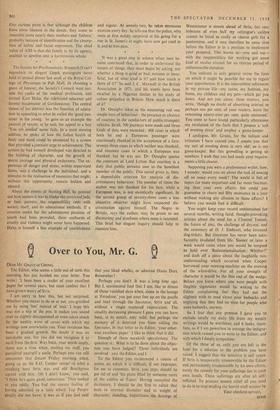A Doctor's Journal
A. I. D.
By MILES HOWARD . THE notion of artificial insemination arouses so strong and so mixed feelings in many people that a cool and detached look at it is always welcome. The author of an article in the Lancet comments that no couple would wish to have a child by artificial means if they could have it naturally; the demand for AID ..is limited by the fact that of the 8 to 9 per cent, of married couples who are subfertile, in one in ten only is the hus- band irremediably sterile. Fears that' AID might become widespread are therefore groundless.
No exact estimate of the number of children born as a result of AID is possible. One doctor who has practised it for sixteen ,years has seen into the world sixty-five babies by this means, and there are probably no more than ten doctors in the country employing the method. The procedure has its greatest value for couples' where the hus- band suffers from infertility, for which no treat- ment is possible, or when one or more babies have died from blood-incompatibility of the rhesus kind. Such marriages are as a rule stable. AID does not attract the frivolously-minded couple. Husband and wife must have agreed together that AID is the right course for them. The doctor who uses the procedure must interview both partners, and satisfy himself that the request comes from both, and that a reasonable standard of living can be offered to the child: in a word, that the couple are `childworthy.'
The responsibility of the doctor is a heavy one, but experience suggests that it is no more so with AID than With adoption, and perhaps less. How- ever, the doctor has the task Of building up a list of donors, who should all be well known to him; plainly, they must be physically and mentally fit. It has been found that, though couples may show some interest at first in the characteristics of the donor, once a child is conceived and born no further reference is made to him, unless a second child is wanted, when parents almost always ask for the same donor.
The bogey • of intermarriage between half- brothers Lid half-sisters as a risk of AID has been grossly exaggerated; it is ertainly less than that of marriage between adopted or illegitimate siblings. A register of AID births, which would be open to inspection under proper safeguards, might be a valuable measure, though the administration of such a system would need careful planning. In a series of seventy cases in the author's practice, only two have been lost sight of, and nearly a third have returned for further AID. The child- ren are reported as .being healthy in every way.
Or ha re pr ho va en re he leg gu sid in fo the tio sio Pa
fiy•
ad bo tha sys the mo pe lirn sti wi un
out or soc ore yo cru Ha
le curious point is that although the children ve some likeness to the donor, they come to iemble more nearly their mothers and 'fathers,' 3bably because of identification and the absorp- n of habits and facial expression. The chief lue of AID is that the family is, by its agency, ibled to develop into a harmonious whole.
The Society for Psychosomatic Research (I can't woduce its elegant Greek monogram here) Id its annual dinner last week at the Royal Col-
e of Physicians in Pall Mall. In choosing a est of honour, the Society's Council went ()Lit- e the ranks of the medical profession, and 'lied Kurt Hahn, the celebrated educator and Trier headmaster of Gordonstoun. The central ;me of his address was the function of educa- n in appealing to what he called the 'good pas- ns' in the young : he gave as an example the ision of rescue; as he said, the appeal to a boy )u ate needed' never fails. In a most moving iress, he spoke of how the fullest health of Jy and mind could be promoted by a system provided a constant urge to achievement. The tern he had himself developed was directed to building of character, and the growth of Ira' courage and physical endurance. The ex- ience of danger and stress, within supervised its, was a challenge to the individual, and a nulus to the realisation of resources that might, hout this opportunity, remain hidden and ised.
kbout the events of Notting Hill, he pointed how useless it was to blame the convicted lads, their parents; the responsibility rests with iety itself, and its educational methods. If a ative outlet for the adventurous passions of ith had been provided, these outbursts of elty and violence might never have happened. hn is himself a fine example of youthfulness and vigour. At seventy-two, he takes strenuous exercise every day; he tells me that the police, who were at first mildly surprised at his going for a run in St. James's at night, have now got used to it, and let him pass.
* :It was a great step in science when men be- came convinced that, in order to understand the nature of things, they must begin by asking, not whether a thing is good or bad, noxious or bene- ficial, but of what kind is it? and how much is there of it?' So said J. C. Maxwell to the British Association in 1871, and his words have been recalled by a Nigerian doctor in his study of colour prejudice in Britain. How much is there of it?
Dr. Onuigbo takes as his measuring rod one simple item of behaviour : the presence or absence of courtesy in the conductors of public-transport vehicles. In all, 500 journeys were made and three kinds of data were recorded : 408 cases in which both he and a European passenger were courteously thanked in the acceptance of a fare; seventy-three cases in which neither was thanked; and nineteen cases in which a European was thanked, but he was not. Dr. Onuigbo quotes the comment of Lord Lytton that courtesy is a duty that public servants owe to the humblest member of the public. This social grace is, then, a dependable criterion for analysis of dis- criminatory behaviour. The number of times the author was not thanked for his fare, while a European was, is not statistically significant. In the second group of seventy-three cases a less objective observer might have suspected dis- crimination against himself. The Negro in Britain, says the author, may be prone to see discourtesy and aloofness where none is intended. This brief but elegant inquiry should help to reassure him.







































 Previous page
Previous page